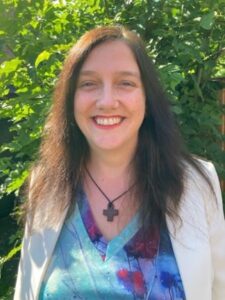The Twenty-Seventh Sunday after Pentecost (Proper 29), November 24, 2024
October 7, 2024 | by Doral Hayes
| Reading 1 | Reading 2 | Reading 3 | Reading 4 | Reading 1 Alt | Reading 2 Alt |
|---|---|---|---|---|---|
| 2 Samuel 23:1-7 | Psalm 132:1-12, (13-18) | Revelation 1:4b-8 | John 18:33-38 | Psalm 93 | Daniel 7:9-10, 13-14 |
Some years ago, I remember being quite stunned when a Roman Catholic nun said to me that she believed that Christianity was the “truest way” to God. This seemed a very radical statement from someone with a deep Christian faith rooted in a specific Christian tradition. Reflecting on John 18, I remembered this statement. Pilate’s question in John 18 verse 38 also has a great resonance with the current zeitgeist. Developments in technology, social media and politics have created doubt in society and we too ask, as Pontius Pilate did, “what is truth”?
Pontius Pilate was a politician, the Governor, a man wielding power and intoxicated by the approval of the crowds. Later in this chapter we see Pilate using the mood of the day to stay popular, to remain in a position of power. I am sure this sounds a familiar story.
As history is written by the victors, so truth is often defined by those with power. Those in leadership who have status and respect; those whose voice is heard. To gain a fuller picture we need to ask whose voice is missing and whose truth is not being heard?
Alfred North Whitehead wrote, “there are no whole truths; all truths are half-truths. It is trying to treat them as whole truths that plays the devil.” Whitehead is saying that it is impossible to be truly objective and to be believe that we are, to think we see the whole truth is dangerous. It can make us short sighted, lacking compassion, narrow in our thinking and shallow in our faith. There is always more than one way of viewing a situation or a person, just as there is always more than one way of perceiving faith, worship and even the nature of God.
My experience across the diverse traditions of the Christian Church has led me to believe that there is always more to learn and experience as we seek to understand and journey in relationship with God.
Thomas Jay Oord writes “I believe an open and relational view of God makes most sense overall. But I am not certain, I do not know God fully and so I cannot be 100% sure. I look at reality through limited and sometimes distorted lenses, which means my vision is cloudy” (2021).
I appreciate Oord’s admission of uncertainty. It is a good thing to be humble and admit our vision is not clear. We each bring our own lens, our own experience, and our own baggage as we try and discern the truth. In order to perceive more of the truth, we need to be aware of our own limitations and prejudices. We also need to find courage to ask questions, challenging our own norms and assumptions as we speak to others about their experience. It is often those who are the most different from us, whose truth we find most uncomfortable, who can teach us the most.
“Grace to you and peace from him who is and who was and who is to come”. Revelation 1 v 4
Optional Resources
This months lectionary integrates scripture with aspects of popular culture. When we engage with scripture or with a church service we take with us those things that influence us from broader life and culture. Below are some suggestions that came to me from as a I reflected on these passages; this list is by no means exhaustive. If you find them useful please do use them as you prepare to lead worship this coming week. May they bless you.
Books and Film: Pinocchio, The Truman Show, The Usual Suspects and A Short History of Truth by Jullian Baggini.
Music and songs: Policy of Truth by Depeche Mode, Would I Lie to You by The Eurythmics, Do I Lie by Alisha Attic, Honest by The Chainsmokers.
References
Oord, Y, J. (2021) Open and Relational Theology: An Introduction to Life Changing Ideas. USA: Sacrasage Press.
Whitehead, A, N. (1979) Process and Reality. New York: The Free Press.
 Doral Hayes is the Principal Officer for Ecumenical Development and Relations at Churches Together in England and is a Licensed Lay Minister in the Oxford Diocese of the Church of England. Doral holds a MA in Contemporary Christian Theology from Newman University, Birmingham and is currently undertaking doctoral research in ecumenical theology at the University of Roehampton, London. Doral is a contributor to Preaching the Uncontrolling Love of God, edited by Jeff Wells, Thomas Jay Oord, et. al. She lives in Buckinghamshire, England with her husband, two teenage children and a crazy whippet.
Doral Hayes is the Principal Officer for Ecumenical Development and Relations at Churches Together in England and is a Licensed Lay Minister in the Oxford Diocese of the Church of England. Doral holds a MA in Contemporary Christian Theology from Newman University, Birmingham and is currently undertaking doctoral research in ecumenical theology at the University of Roehampton, London. Doral is a contributor to Preaching the Uncontrolling Love of God, edited by Jeff Wells, Thomas Jay Oord, et. al. She lives in Buckinghamshire, England with her husband, two teenage children and a crazy whippet.
